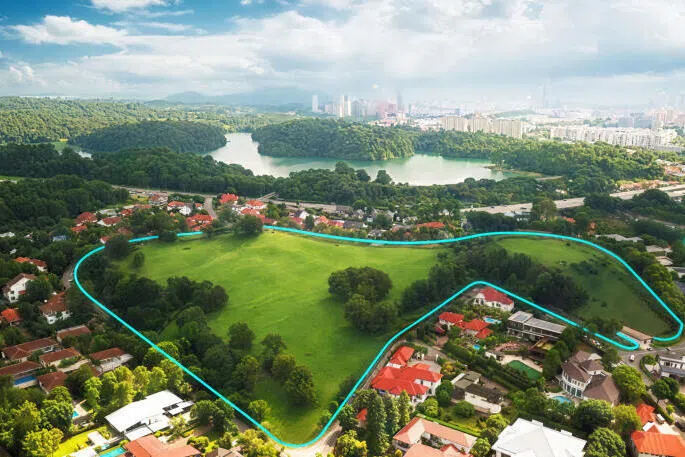Perennial to sell former Mediacorp site for $350m to focus on healthcare and healthcare real estate
Sign up now: Get ST's newsletters delivered to your inbox

Zoned for civic and community institution use, the 752,014-square-foot leasehold land could be redeveloped into more than 60 two-storey bungalows.
PHOTO: SAVILLS SINGAPORE
- Perennial Holdings plans to sell the former Caldecott Broadcast Centre site for over $350 million, having bought it in 2020 for $280.9 million.
- The 752,014 sq ft leasehold site, zoned for civic & community institution, could accommodate over 60 good class bungalows, subject to approvals.
- The sale is driven by Perennial's pivot to healthcare and healthcare real estate, including the $260 million Perennial Living assisted living development opening in 2026.
AI generated
SINGAPORE – Real estate and healthcare company Perennial Holdings has put up for sale, at a guide price of more than $350 million, the former Caldecott Broadcast Centre site it had acquired from national broadcaster Mediacorp.
An entity jointly owned by Perennial and Wilmar co-founder Kuok Khoon Hong had bought the hilltop site for $280.9 million in late 2020 to build what was to be the biggest cluster of leasehold Good Class Bungalows (GCBs) in a predominantly freehold GCB area in Caldecott Hill.
A Perennial spokesperson said on Nov 11 that it had “originally planned to redevelop the site to build large GCBs”.
Zoned for civic and community institution use under the 2019 Master Plan
Put on the market via Perennial’s indirect associate firm, the site’s proposed sale comes as the company recalibrates its resources to build its healthcare and healthcare real estate businesses.
In August, Perennial announced the planned opening of Perennial Living, Singapore’s first private assisted living development, by the first quarter of 2026 in a bid to redefine private eldercare standards.
The $260 million project of 200 apartments in Parry Avenue will come with private lift access, sky terraces, a clubhouse with dining and lifestyle amenities, personal concierge services, and a rehabilitation, medical and wellness centre.
Savills Singapore and Delasa were appointed real estate advisers to sell the former Caldecott Broadcast Centre land via an expressions-of-interest exercise, which will close on Jan 15, 2026.
Delasa chief executive Karamjit Singh noted that “sustained growth in Singapore’s economy, wealth and population continues to favour the bungalow segment, where supply has remained virtually unchanged”.
“This scarcity, coupled with rising household wealth and the arrival of new ultra-high-net-worth residents, continues to support robust demand and pricing in the bungalow market,” he said.
Savills managing director Jeremy Lake said: “Few sites offer such a blank canvas to create an entirely new and distinctive landed development. Developers would benefit from the groundwork carried out so far, including the demolition of all the structures on site, engagement and master planning.”
Detached home transactions in prime districts 9, 10 and 11 reached $1.11 billion in the first 10 months of 2025, surpassing $1.105 billion in 2024 and $1.02 billion in 2023, he added.
Mr Eugene Lim, ERA Singapore’s key executive officer, believes that despite its 99-year leasehold tenure, the site’s prime location will appeal to landed home buyers.
“With a leasehold tenure, it is likely to be priced more attractively than comparable freehold homes in the same area,” he said.
He added that due to the project’s leasehold tenure, the future buyer could subdivide the land into bungalow plots with a minimum land area of 400 sq m, rather than into GCB plots with a minimum land area of 1,400 sq m, to keep the project’s bungalow prices affordable.
Mr Singh said: “Apart from traditional developers, we also anticipate a consortium of ultra-affluent Singaporeans – including extended families banding together to acquire the site to develop bespoke mansions.
“They can curate a super-luxury enclave to their own design, live as immediate neighbours and enjoy a discounted price to freehold bungalows.”
Dr Chua Yang Liang, JLL’s head of research and consultancy, South-east Asia, said the GCB market for 99-year leasehold properties has not really been tested in Singapore.
“Another key consideration is that the land betterment charge (LBC) payable would be substantial since the site is currently zoned for civic and community institution use,” he added.
Developers pay an LBC for the right to enhance the use of some sites or to build bigger projects on them.
The leasehold site has a balance lease term of 68 years, which means the developer would also need to pay a lease upgrading premium to the Singapore Land Authority to extend to a fresh 99-year tenure.
“Given its current zoning and history, it is highly unlikely that non-landed housing forms, such as condominiums, would receive planning approval. Earlier proposals for such developments have been rejected,” Dr Chua noted.
Pricing of the future Caldecott Hill project would depend on factors including “any change in zoning status, market sentiment and the level of allowable redevelopment”, he said.
But given the lack of recent transactions for 99-year leasehold GCB land, it is difficult to provide an accurate pricing benchmark at this time, he noted.



